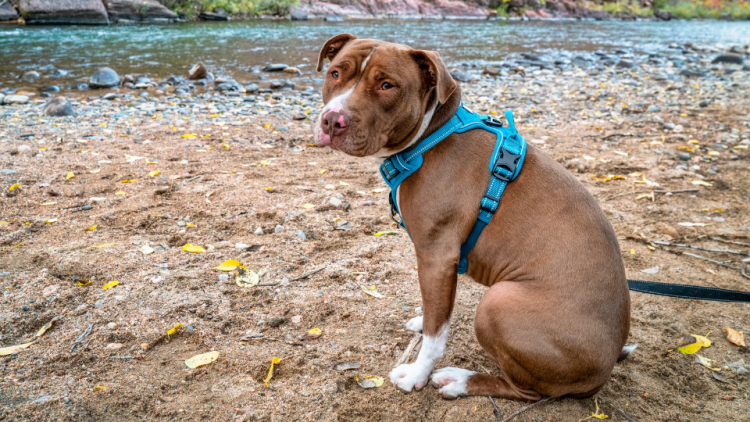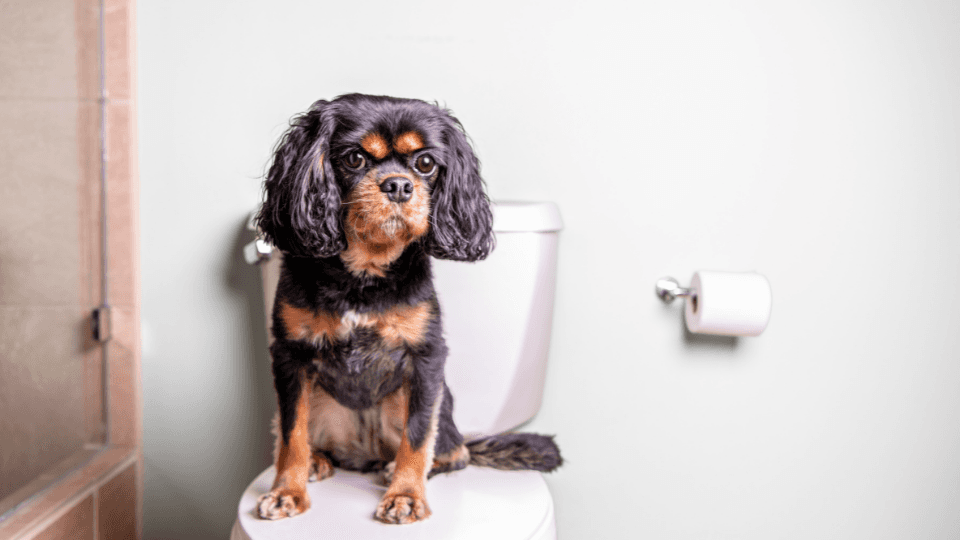Diarrhea is a pretty common occurrence in dogs. The condition varies in intensity, frequency, and duration from case to case. It often passes quickly on its own, but ongoing diarrhea in dogs can be a sign of a more serious health condition.
In this post, we’re discussing the many different causes of diarrhea in dogs, signs that indicate a cause for concern, and when it's time to see the vet. We'll also cover home remedies for dog diarrhea to help get your pet feeling back on track as soon as possible.
Table of Contents:
- What is dog diarrhea?
- What causes diarrhea in dogs?
- Types of diarrhea in dogs
- What does different dog poop mean?
- Home remedies to stop dog diarrhea
- When to see the vet for dog diarrhea
- How to treat diarrhea in dogs
- Key Takeaways
Pro Tip: In cases of severe diarrhea, don't delay a vet consultation. If you're enrolled in a pet insurance plan, you can stress less about the cost of a vet visit and focus more on ensuring your loved one has access to gold-standard care.
What is dog diarrhea?
Diarrhea refers to loose, watery stools usually occurring in large and/or frequent amounts (three or more times per day). Diarrhea in dogs isn’t a condition in itself but rather a symptom of another physical ailment.
What causes diarrhea in dogs?
Dogs have diarrhea due to changes in their digestive tract triggering a flareup in the bowels. The inflamed intestinal lining loses its ability to hold water in the cell tissue. The water then mixes with stools and comes out as the runny poop we recognize as diarrhea.
Many things can trigger this unpleasant bodily reaction, but the most common causes of diarrhea in dogs include:
- Eating spoiled food - Dogs that chow down on anything they can find (for instance, rotten food on the ground or in the trash) often suffer from a condition known as garbage gut. Most cases of garbage gut are mild and usually manifest with a stomach upset. However, depending on what they ingest, your pet could develop pancreatitis, a serious condition that requires veterinary care.
- Consuming certain human foods - Dogs have a very different digestive system than their pet parents. They have a hard time processing foods high in salt, sugar, and fat, which leads to the fermentation of undigested food particles often smelled through passed gas. Be mindful of food dogs can and can't eat before giving them table scraps.
- Ingesting toxic substances - Some foods perfectly suitable to humans are poisonous to dogs, such as garlic, walnuts, and grapes. Ivy, honeysuckle, and holly are just a few household plants toxic to dogs. Prescription drugs, cleaning chemicals, ice packs, silica gel sachets, and charcoal all present the risk of accidental poisoning, as well. Toxicosis can cause more than diarrhea in dogs - it could result in liver failure. Get to the vet as soon as possible in the event your pet consumes something dangerous.
- Swallowing a foreign body - Dogs are notorious for eating inedible things, from paper to socks, rocks, wrappers, and beyond. Some of these objects can pass through their digestive system without a problem. However, in some cases, they can create an intestinal obstruction. If you suspect your pet swallowed a foreign object, keep an eye for signs like diarrhea, abdominal pain, vomiting, decreased appetite, lethargy, constipation, and aggressive behavior when touched.
- Dietary changes - Although kibble is made for canines, any sudden change in diet can cause diarrhea and in dogs. If you're switching your pet over to new food, try to do so slowly. Mix in a small portion of the fresh food with their current diet staple and gradually increase the serving size to meet their nutritional calories.
- Intestinal parasites - Parasitic infections are very common in canines, especially among those near stagnant bodies of water, puddles, or creeks where parasites like giardia are present. These microscopic organisms can contaminate a water source dogs drink from, thereby inhabiting the intestinal lining. In these cases, the poop can look greasy, frothy, and mixed with mucus. Your vet will recommend the best treatment to remove the parasite.
- Viral and bacterial infections - Viral conditions like distemper in dogs and parvovirus in puppies are highly contagious and potentially life-threatening. In addition to foul-smelling diarrhea, they can also cause clinical signs like vomiting, lethargy, fever, and loss of appetite. Immediate veterinary care is required. Bacteria found in raw or improperly cooked meats, such as Salmonella, can also cause diarrhea in dogs. Dogs can also pick up a bacterial infection through direct contact with infected dogs. With bacterial infections, you may notice bloody diarrhea recurring every two to four weeks.
- Irritable bowel disease - Known as IBD, this condition causes the canine's digestive tract to become consistently inflamed. The most common symptom of IBD in dogs is recurring bouts of diarrhea.
- Chronic illnesses - Ongoing diseases like cancer, kidney failure, and liver disease can also cause diarrhea. Other possible symptoms of a severe health condition can include vomiting, weight loss, hunched over posture, blood in the urine, lack of appetite, and lethargy. Take these red flags seriously at first sight.
- Allergic reaction - If your pet has an allergic reaction, their body will try to flush out the allergens in several different ways, including diarrhea. Additional symptoms of an allergic reaction you should watch out for include sneezing, runny eyes, chewing or licking paws, and itchy skin.
- Side effects of medication - Pet parents should always be mindful of potential adverse drug reactions, but some medications tend to cause diarrhea in dogs more than others. Certain drugs, like pain-relieving NSAIDs (non-steroidal anti-inflammatories drugs), add a binding agent during the manufacturing process. The dog's diarrhea is often caused by the binding substance (such as lactose) rather than the actual drug itself.
- Stress or emotional upset - Many pet parents are surprised to learn this is one of the most prevalent and least obvious causes of diarrhea in dogs. Your pup's psychological state can significantly impact their physical disposition, so think back to any possible stressors that may have triggered your dog's diarrhea. Travel anxiety and environmental changes are two common examples.

Many potential issues could explain why a dog has diarrhea, which can make pinpointing the underlying problem a little tricky. Your vet will likely ask about the presence of other symptoms and the duration of the condition to determine which type of diarrhea they need to treat.
Types of diarrhea in dogs
Diarrhea in dogs can be acute or chronic.
Acute diarrhea often resolves on its own, but you should see a vet if:
- It has lasted for more than 48 hours,
- There’s blood in the stool, or
- Dog displays another symptom (such as vomiting)
Chronic diarrhea, on the other hand, is recurrent in nature or persists despite initial treatment. It's usually caused by parasites, inflammatory bowel disease, cancer, hyperthyroidism, continuous exposure to a diet your pet is sensitive to, etc. Chronic dog diarrhea can also lead to weight loss, lethargy, and dry coat.
Depending on where it arises, canine diarrhea can be broken down into two categories: small-bowel and large-bowel diarrhea.
Small-bowel diarrhea arises from the small intestine and is characterized by frothy and fatty stools which are produced at a normal frequency. There is usually no mucus, blood, or straining involved. Dysfunction or inflammation of the small intestine can also cause weight loss, ravenous appetite, and poor coat appearance.
Large-bowel diarrhea arises from the colon or large intestine and is characterized by small volumes of stool at an increased frequency, blood and/or mucous in the stool, and straining to defecate. The presence of blood in the pup’s stool is not always a reason for concern but if blood is consistently in the stools or there are big amounts of blood, you should definitely get in touch with your vet.
What does different dog poop tell you?
The color and consistency of your dog’s stool can tell you a lot about their health. The poop of healthy dogs is compact, shaped like logs, and chocolate brown in color. Larger volumes of poop, watery stool, as well as those containing blood or mucus, are out of the ordinary.
The color can say a lot about what is going on in your pup’s body. Gray, green, orange colored stools might signal issues with certain organs like the pancreas, liver, or gallbladder. Black stools might be an indication of internal bleeding and should be taken quite seriously, whereas blue diarrhea could mean that your doggy has eaten a toy or rat poison (which is usually blue). If you see this, contact your vet right away, and bring a stool sample if possible.
Besides color, you should also pay attention to the frequency and consistency of dog poop:
- Healthy dogs have one or two bowel movements per day.
- A normal stool has a consistency similar to cookie dough.
- Chalky and crumbly stools are also normal if your dog is on a raw diet with plenty of bone.
- If you notice solid objects in your dog’s poop, you might be able to tell if they have eaten something they couldn’t digest.
- The presence of rice-like shapes can be a sign of tapeworm infestation.
Usually, dog diarrhea resolves itself fairly quickly and without treatment. However, in some cases, loose stool can be a clinical sign of severe, potentially life-threatening diseases, such as cancer or organ system failure. Also, diarrhea caused by a minor illness could develop into a more serious issue if left untreated and results in dehydration.
Diarrhea in puppies
If your puppy has diarrhea, keep a close eye on them as it can be a sign of a serious health condition such as intestinal parasites, exposure to dangerous bacteria, or parvovirus. Be sure to get in touch with your vet, especially if the puppy’s stool contains blood, smells foul, is black and tarry, or if the diarrhea is accompanied by sickness, pain, loss of appetite, and/or fever.
Home remedies to stop dog diarrhea
Managing milder cases of dog diarrhea at home is often simple. Here are the steps you can take to help your pet with home remedies:
Fasting
Fasting. If your pup develops sudden diarrhea, stop giving them food for 12 - 24 hours and only provide small amounts of water frequently. This can help determine what caused the upset and allow the gastrointestinal tract to settle. Before you decide to put your dog on a fast, be sure they can endure it. For instance, puppies and geriatric dogs might not have enough physical reserves and need to consume enough nutrients.
Probiotics
Probiotics are live microorganisms that are good for the digestive system. They are used to treat and prevent a number of health issues, including diarrhea. Your vet will be able to recommend the best probiotics for your canine companion.
Medication
Over-the-counter (OTC) medications for humans might also be effective for dog diarrhea, but should be given with caution and only after your vet has allowed you to do so.
Diet
Foods can help dogs with diarrhea. Once your dog’s diarrhea is resolved, you can start introducing food slowly. Some of the best food options include white or brown rice, rice water, yogurt, canned pumpkin, cottage cheese, boiled potatoes (without skin), chicken (without skin), eggs, and certain herbs like fennel. Soups and broths are also a gentle way to help your dog transition back to their normal diet. Just make sure they’re low in sodium and have limited ingredients.
Some manufacturers also offer specially-formulated dog foods that can alleviate stomach issues. You might need to obtain them from your veterinarian.

When to see the vet for dog diarrhea
If your dog is healthy and has a strong immune system, the home remedies suggested above should help resolve diarrhea within a couple of days. However, there are certain situations when it is absolutely necessary to see the vet:
- If the home remedies don’t help and diarrhea lasts for more than three days;
- If your dog shows other clinical signs like vomiting, lethargy, weakness, fever, dry or pale gums, etc.;
- If they use medications like antibiotics;
- If they are old or suffer from certain conditions like diabetes, cancer, or Cushing’s disease.
When you go to the vet, they will start by asking you about your dog’s health history, how long they have had diarrhea, and what clinical signs you have noticed. The vet might also ask you about the color of the stool and whether your dog has ingested anything that they weren’t supposed to. This information will help the vet narrow down the list of tests they want to run.
Some of the most common test used by vets to help them narrow down the long list of possible diagnoses include fecal flotation to look for intestinal parasites, Parvo testing, Giardia tests, CPL tests to check for the presence of pancreatic lipase, gram stains to look for certain types of intestinal bacteria, complete blood count to look for signs of inflammation, protein loss, anemia, metabolic disease, and more. Your vet might also order X-rays or ultrasound to look for evidence of obstruction, cancer, inflammatory bowel disease, gallbladder disease, etc
How to treat diarrhea in dogs
Your vet will prescribe adequate treatment depending on the diagnosis.
- Metronidazole and Tylosin are commonly prescribed anti-diarrheal agents that help decrease intestinal inflammation which often causes diarrhea.
- Dewormers commonly used include Panacur, Dolpac, and Drontal.
- If your dog is vomiting or suffers from a lack of appetite, the vet might recommend anti-nausea medication.
- Chemotherapeutic drugs might be prescribed if the diarrhea is caused by cancer
- Stomach protectants and antacids are given to help with stomach irritation and irritation of the upper digestive tract.
- The treatment plan might also include a prescription of a bland diet, a hypoallergenic diet, or a high-calorie diet.
Remember, it’s always a good idea to get in touch with your vet whenever you’re concerned about your dog’s health.
Pro Tip: Keeping your pup healthy isn’t always possible without assistance from the veterinarian. One of the best ways to offset these expenses is to purchase pet insurance so you can protects your four-legged friend and your budget.
What is the prognosis?
The outcome in dogs will depend on the severity of diarrhea, the specific diagnosis, as well as the animal’s response to treatment. Most dogs with mild diarrhea will make a full recovery, while those suffering from chronic diarrhea might need medication or dietary management in order to keep the condition under control.
Key Takeaways
- Diarrhea, which is characterized by liquid to soft stool, is a common problem in dogs. In most cases, it is caused by dietary indiscretion.
- Typically, dog diarrhea isn’t serious and dogs will get better on their own. You can help your dog at home by withholding food for 12-24 hours and provide probiotic supplements.
- In cases of persistent diarrhea or when the diarrhea is accompanied by other clinical signs like vomiting, lethargy, bloody stools, or loss of appetite be sure to contact your vet as soon as possible.
